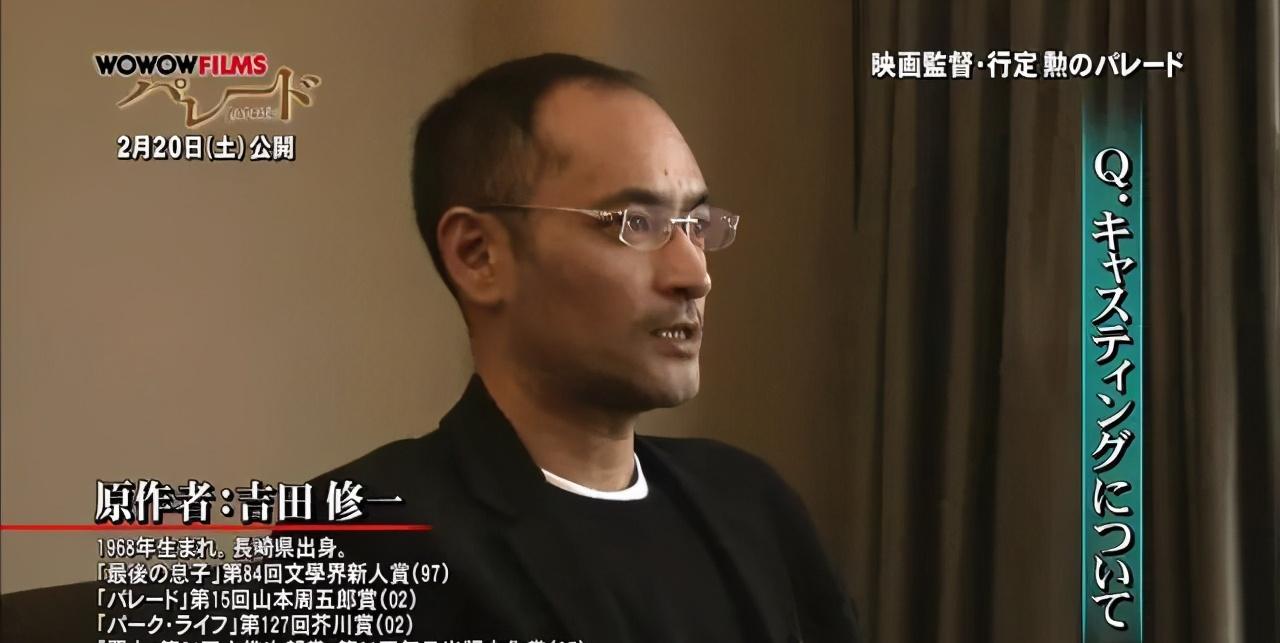For most Chinese readers or viewers, Shuichi Yoshida is not a familiar name, but his novels have always been the fragrant food of Japanese film and television adaptations. Looking at the list of films adapted from his novels, Shuichi Yoshida became the "most familiar stranger."
From "Living Together", which reflects the loneliness and helplessness of urban young people at present, to "Evil People", which won the "Xunbao Annual Best" that year, aiming to criticize the cruel society;
From the warm and incomparable ordinary people's epic "Yokomichi Seinosuke", to the "Goodbye Valley", which is known as the "modern version of "Resurrection".

These outstanding adaptations directly brought the unknown film and television practitioners such as director Lee Sang-il and actor Yoko Maki to the podium of the Japan Academy Awards, known as the "Oscars of Japan".
In 2014, Shuichi Yoshida released his blood-soaked work "Fury", and the film version of "Fury" immediately entered the production stage.
Lee Sang-il, who directed "The Wicked Man," reunited with Shuichi Yoshida, and the 2010 film "The Wicked Man" grossed nearly 2 billion yen at the box office and won five awards at the 34th Japan Academy Awards.
The great success of the previous game also made "Rage" attract stars such as Ken Watanabe, Aoi Miyazaki, Satoshi Mufu, and Tsuyoshi Ayano, forming a strong cast of Kashi, and the soundtrack invited Ryuichi Sakamoto, who won the Oscar for best score for "The Last Emperor".
This lineup is enough for fans who have not read the original book to have a desire to peek into the end.
The story of "Fury" is divided into three chapters: Chiba, Tokyo, and Okinawa, and revolves around a murder case in the Hachioji area of Tokyo.
After brutally killing a couple, the killer left a bloody word at the scene of the murder - "anger", and then underwent plastic surgery and began to die. The brutality of the murderer is heinous, but the motive has always plagued the police.
A year later, the killer is still at large. At this time, the three mysterious men who appeared in Chiba, Tokyo, and Okinawa all had some kind of connection and coincidence with the murderer.
In Chiba, Tetsuya Tashiro (Kenichi Matsuyama) works for the fisherman Yohei (Ken Watanabe) at a fishing port and falls in love with Yohei's daughter Aiko (Aoi Miyazaki), but Yohei and Aiko later begin to suspect that Tayo is the murderer, and when they decide to call the police, Tayo disappears.
In Tokyo, Yuma Fujita (Satoshi Mufu), who works at an advertising agency, and Naoto (Tsuyoshi Ayano), who has an unknown origin, gradually develop a gay relationship from a night out, and as the two become more intimate, Yuma begins to wonder if Naoto is the absconding murderer.
In Okinawa, an eyewitness to the killing (Mirai Moriyama) is involved in the case.
The final ending of the story reveals the evil that seems to be bland but hurts ordinary people greatly: believing what should not be believed, doubting what should not be doubted.
The film takes the three places as the background, builds a network of interpersonal relations, presents and observes the relationship with the crime through the different perspectives of the three cities, and in the process of the truth being revealed, the different encounters of the three suspects reflect the ebb and flow of human nature.
Ken Watanabe said: "The kind of pain that the film shows is regardless of region, and it will sting the audience deeply. ”
Tragedy begins with the murderer's guilt, but anger comes from the destruction of trust. This is also the real purpose of the director, he wants to explore the plight of life behind the crime that has plagued modern people for a long time.
"Rage" is the second time that director Lee Sang-il has partnered with Shuichi Yoshida after "Wicked", and the two have worked together as screenwriters.
From the perspective of the difficulty of adaptation, "Rage" is much larger than "Wicked", the original does not string together different characters in the three places, if you want the audience to believe that an event will have a huge impact on unrelated people, you need to "strengthen the influence of the event conceptually" as Lee Sang-il said.
The control of time is also a major difficulty, for which Li Xiangri admitted frankly: "The subdivision of this story is a story that takes place in three different places, but has many similarities.
Presented on the image, there may be some similar paragraphs, after shooting each story separately, how to make them develop linearly, I am very distressed.
Eventually, I changed the timing of the original, so now all three stories take place in the same summer. ”
As for where "anger" comes from, Lee Sang-il said: "Although 'Rage' is a suspense type movie, its core is not to find the murderer or solve the mystery, but trust and loneliness, which is the biggest mystery of the film. ”
In Shuichi Yoshida's view, indifference is the greatest evil in modern society, "Love is to regard certain things as more important than oneself, evil is to regard oneself as the most important, and those who do not even cherish the object are the source of anger." ”